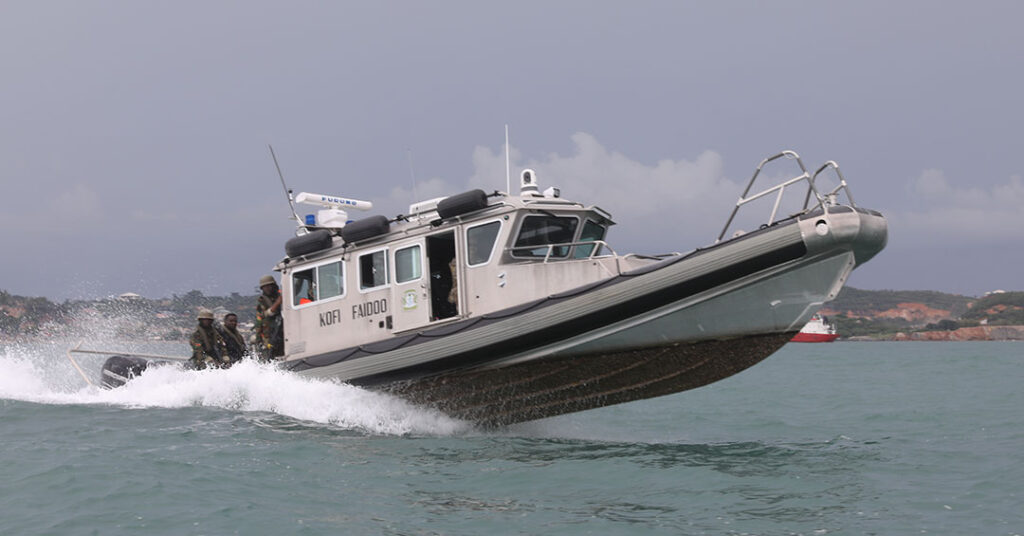ADF STAFF
Policing maritime crime in Africa’s coastal waters requires more than simply intercepting suspect ships or arresting possible drug traffickers. It also requires careful attention to collecting evidence that can be used later to prosecute those criminals — skills that sailors often lack.
Obangame Express 24 sought to fill that skill gap as part of its overall agenda aimed at building collaboration among countries operating within the Yaoundé Code of Conduct. Launched in 2013, the code plays an increasingly important role in maintaining situational awareness and fighting maritime crime in the Gulf of Guinea, one of the world’s hottest spots for piracy, illegal fishing, drug trafficking and other illegal activities.
From May 6-17, Obangame Express 24 challenged 13 nations along the Gulf to work together to respond to criminal activities off their shores. Along with field exercises off the coast of Gabon, Obangame included training on first aid, room-clearing and evidence collection.
Also on the agenda for the first time: training participants in the steps to bring maritime criminals to justice.
“Through multiple days of training and a mock trial, … we demonstrated that the international and regional collaboration of the different partners is a resultant-provider to ensure a secure maritime space in the Gulf of Guinea,” said Aliou Sall, crime prevention and criminal justice officer of the Global Maritime Crime Program for Central Africa at the United Nations Office of Drug Control (UNODC).
What experts refer to as the “legal finish” to maritime criminal cases has become a crucial part of reining in illegal behaviors in the Gulf. In many cases, security forces disrupt drug trafficking only to have the suspects go free because the country where they were arrested has no legal structure to prosecute them.
That gap between arrests and convictions was a key topic among African maritime authorities during the joint African Maritime Forces Summit-Naval Infantry Leadership Symposium Africa in Ghana in early May. Maritime security leaders at the conference said that under the Yaoundé Code of Conduct, countries must ensure that their laws meet the needs of modern problems and align to create a unified front against criminals that game the system, often by fleeing to countries without legal systems to prosecute them.
“It’s one thing to make an arrest. It’s another thing to prosecute,” Nigerian Navy Cmdr. Jibirl Umar Abdullahi told ADF during the conference.
Nigeria, for example, is one of the few Gulf of Guinea countries with laws against piracy.
Legal experts from across the Gulf region, which runs from Angola in the south to Senegal in the west, participated in Obangame Express, which provided participants with training in forensic techniques for managing crime scenes.
“They are the first person at sea that will take action during an investigation,” Interpol Regional Maritime Security Directorate Criminal Intelligence Officer Ludovic Payet said in a statement. “If they do not use personal protective gear, they could contaminate the crime scene. We teach them the basics so we can have a strong police case.”
On the final day of instruction, participants boarded Ghana Navy ships and small boats to apply all that they had learned, including boarding techniques and small boat helmsmanship. The militaries worked together, sometimes communicating with hand signals where they had a language barrier.
Sall said in a statement that the lessons learned throughout the Obangame Express will prove valuable in daily operations, especially as countries develop more avenues of cooperation.
“We must continue to find common ground in this area and continue to improve our procedures not only within individual nations, but across national and zonal boundaries as well,” Sall said. “These maritime threats are not relegated to only one nation. So, by working together on maritime prosecution, we ensure that the perpetrators of illegal activities have no safe place to hide in [Gulf of Guinea] waters.”

